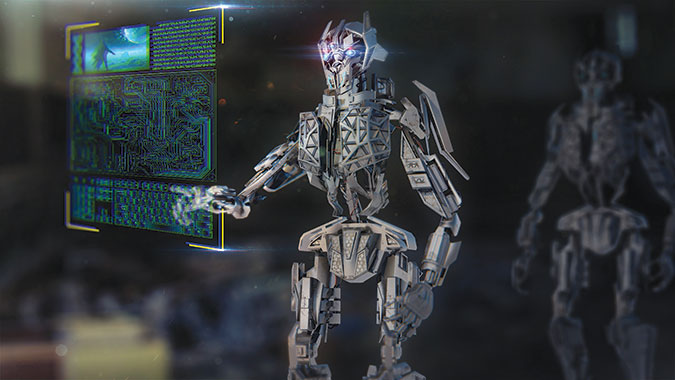

It’s not often we can say that someone was destined for a specific future, but in the case of Gerhard Furter, head of R&D at Iris AI, his destiny in the world of software development became clear when he was in Standard 4 (Grade 6 in today’s terms) at a primary school in Newcastle.
These were the early days of computing when few people had computers at home, or anywhere outside of academic or corporate environments. An individual from the Newcastle Technicon was busy with a study to try to determine the earliest age at which children could start using computers effectively, and at the same time they were trying to prove that an aptitude in mathematics meant an aptitude for software development.
A number of kids were sent for an aptitude test, Gerhard among them, and his results showed an extremely high aptitude for maths. Because of this, although he was younger than the others, Gerhard was included in a group that attended an additional computer class twice per week. The class used Sharp 64 computers and coded in QBasic.
At the end of the course, only Gerhard passed and received a certification in software development from the Technicon. Gerhard had found his passion and by the end of Standard 5 he had a diploma in software development. Thanks to his grandmother, he had a Dragon 64 at home to practice on – with an old black and white TV for a screen and a massive 9 KB of memory. The system was meant for games, but one could also code in QBasic with it.
Gerhard continued his education in computing and software development into his high school years, until he was kicked out of the class for trying to tell the teacher how something was supposed to be done. He remembers the teacher in question telling him: “you will never be able to make a living as a software engineer.”

The right place and the right people
Gerhard continued to teach himself until he finished matric, learning languages such as Fortran, Pascal and Cobol. Then, not having the funds to study further, he went to the Defence Force where his aptitude was again recognised. He was sent to study physics and electronic engineering, and he persuaded his commanders (and the university) that informatics should be part of his course.
He was also seconded to Denel, at the time a world-class weapons research and development organisation. His boss there was busy with fuzzy logic and decision-making engines and Gerhard assisted in various projects, including some of the software used in the weapons systems of the Rooikat armoured vehicle and Rooivalk attack helicopter. It was here that Gerhard learned the basics about machine learning, fuzzy logic and decision-making systems.
He says the time at Denel was a great learning experience and it also allowed him to learn by doing practical jobs. As an old boss once said, while others were writing the manuals, Gerhard was coding them.
Back to school
Once done with the military, Gerhard went back to the University of Pretoria to finish his informatics studies, living in an old Mini because there was only enough money for his studies. A friend he made at the university was on a bursary from a financial institution and she told him the company was struggling with an important project which required an encryption system that destroyed the encryption key once it had been used – in other words a key was generated to provide access, but could only be used once.
Gerhard undertook the challenge in his own time and came up with a solution. His friend then organised a meeting with the relevant executive. Expecting an informal meeting, Gerhard arrived at the bank in denim dungarees and his Hang 10 slops, only to be ushered into a boardroom with a number of people in suits. After fixing the projector so that the executive in charge could show the meeting what was required, Gerhard opened his Dell laptop (which he still has and still boots up – some 20 years later) and demonstrated how his software met their requirements.
Sending the others away, the executive then asked Gerhard if he would sell the software to the bank and how much he wanted. Not used to corporate business, Gerhard replied “about 500,” thinking he could get a quick R500 boost to his finances. After leaving Gerhard in the boardroom for a while, the executive returned with a contract and a cheque for R500 000. (Depositing the cheque at the then Volkskas Bank proved problematic as well, but that’s another story.) Gerhard remembers this event as one of the keystones in his life.
One of the lessons he learned at Denel and in other projects after leaving the military was that one should never say no when it comes to software. When others said something could not be done, Gerhard did it in ways nobody else thought of. This has led to him adopting the personal tagline of “Impossible is only an option.”
Physical security intelligence
Gerhard worked for a number of companies until starting his own business with a partner. In the process he built a reputation of being the go-to person for complex projects that others had failed to complete. He also achieved a reputation for churning out code at an impossible rate – and it worked.
Today he is the head of research and development at Iris AI. He credits two people with helping him along his way to this point in his career, Terence Landwehr and Billy Gilbert. Gilbert taught him the benefits of combining artificial intelligence (AI) and security in the form of using automation to make PSIM platforms more powerful and faster to recognise and react to events.
Over many years, Gerhard has continually developed a platform he refers to as an iPSIM – intelligent Physical Software Information Manager. This software has developed and incorporated AI, machine learning and decision making functionality over the years, making security operations smarter, faster and more reliable.
Key to Maestro is what Gerhard learned from Dr Dense Bjorkman about behaviour. While most management platforms in the security market rely on signals to trigger responses, Gerhard learned that humans and systems all have certain behaviours and if you understand the behaviour, you can initiate actions that control the systems more effectively (and humans too).
Maestro has been designed with this principle in mind, which includes the ability to learn. By monitoring behaviour of people or things, the system learns what is normal and can reliably highlight ‘non-normal’ events and respond in the appropriate manner – which does not always imply getting a human operator involved. The Maestro platform has been deployed at Iris AI and has changed security operations in a number of areas, including the control room.
When building systems, Gerhard relies on another bit of wisdom Gilbert imparted: you have to design your solutions thinking that it is your family under threat and the only chance they have is what your system does. If you are prepared to let your platform protect the lives of your loved ones, then it is ready for the market.
Within Iris AI and the development team working on Maestro, Gerhard also credits Danie and Greg de Villiers for creating the environment where the platform can be developed to its full potential while, as noted above, already being used in real-life security scenarios.
It has been a long road to his current position in Iris AI and Gerhard says the environment created at the company is the best he’s ever experienced. He says this company is his final home and he has no plans of going anywhere – as long as he can continue doing the impossible.
| Email: | [email protected] |
| www: | www.irisai.co.za |
| Articles: | More information and articles about Iris AI |

© Technews Publishing (Pty) Ltd. | All Rights Reserved.